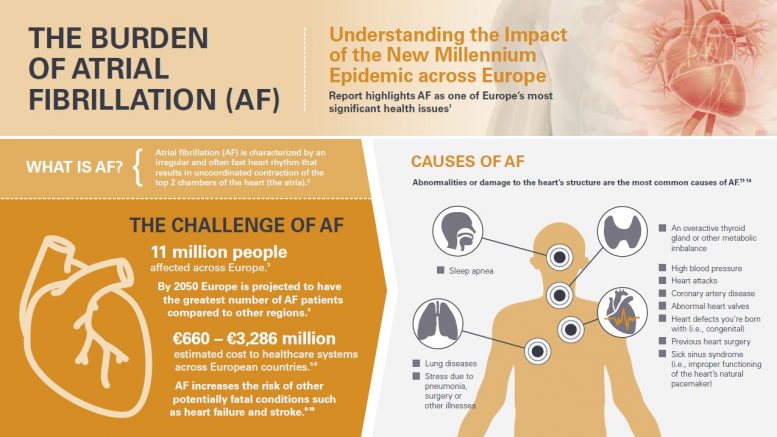A new report, by Biosense Webster EMEA, a Division of Johnson & Johnson Medical NV/SA and leader in the treatment of Atrial Fibrillation (AF), published to coincide with AF Association Global AF Aware Week, uncovers the growing burden of AF on patients, caregivers and healthcare systems across Europe,
The new report is calling for greater awareness and emphasis on the scale and impact of AF which is fast becoming one of the world’s most significant health issues. The new millennium epidemic not only disrupts the quality of life for the 11 million people across Europe who suffer from AF, but also costs healthcare systems up to €3,286 million annually across European countries.
AF is characterized by an irregular and often fast heart rhythm that results in uncoordinated contraction of the top two chambers of the heart. The irregular heart rhythm may cause blood clots, as blood can pool in the heart before being pumped into the brain causing an AF related stroke, a particularly debilitating form of stroke. AF is typically a progressive disease, with 1 in 5 patients progressing from paroxysmal (intermittent) AF to persistent (constant) AF in 1 year.
The report highlights that by 2030 the number of people with AF is projected to increase by up to 70%, and that by 2050 Europe will have the greatest increase in AF patients compared to other regions globally. Furthermore, by 2030 the number of stroke events and medical visits is expected to increase, with 280,000-340,000 new ischemic strokes, 3.5-4 million hospitalizations for AF and 100-120 million outpatient visits expected.
“AF is the most common heart arrhythmia and can be a debilitating disease with life-threatening complications for patients and, unfortunately, is set to become even more prevalent in Europe. The lack of awareness of the burden of AF means that it is difficult to prioritize on the health agenda despite its increasing impact on healthcare systems. The report developed by Biosense Webster serves as a welcome tool that clearly outlines the critical situation and provides a good starting point for us in the cardiology community to renew the focus on AF,” said Professor Gerhard Hindricks, Heart Center Leipzig, University of Leipzig,
“We welcome this new report which brings a much-needed focus on the burden of AF for patients and their families. We also know these prevalence figures are likely to be under-estimates of the scale of the problem, since almost 4 million people are living with undiagnosed AF. We are working towards ways to improve earlier diagnosis as this leads to better management and outcomes for AF patients and less need for high cost emergency care”, commented Trudie Lobban MBE, Founder and CEO, Arrhythmia Alliance and AF Association.
‘’Supporting loved ones and family members with AF can have a significant impact on the lives of the caregivers, who make sacrifices and devote their time and energy at the expense of their own lives and are therefore at high risk of stress. By building a full picture of the impact of AF both on patients and caregivers we will be able to concentrate our efforts and work towards helping to alleviate this burden, experienced by millions across Europe,” added Lobban.
“For over 20 years Biosense Webster has pioneered the development of AF ablation treatments and through partnering with clinicians have been able to heal the hearts of thousands of patients” explains Gabriele Fischetto, Vice President of Johnson & Johnson Cardiovascular Specialty Solutions in EMEA. “However, AF is becoming increasingly prevalent and we need urgent focus to understand the true burden of the disease, so we can work together to tackle it head on.”
A full copy of the report and supporting materials is available here.

